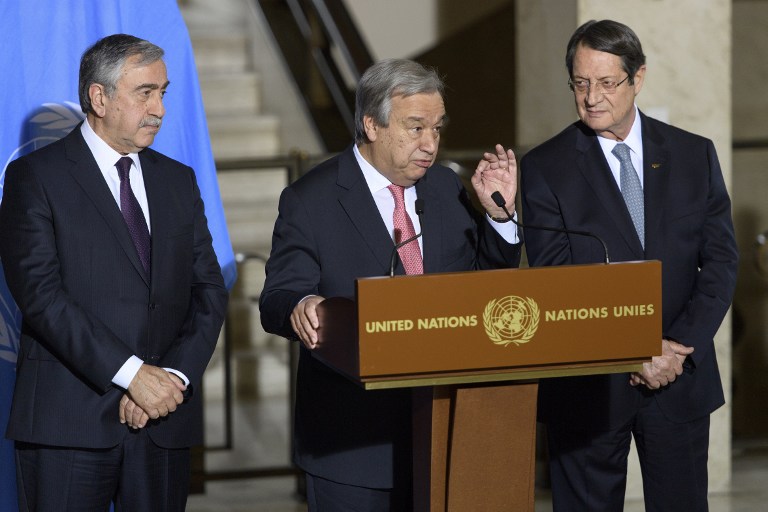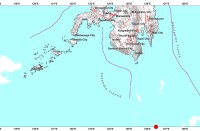
by Ben Simon / Fulya Ozerkan
Agence France-Presse
GENEVA, Switzerland (AFP) – A deal to end decades of division in Cyprus is close, UN chief Antonio Guterres said Thursday, as he led a crunch conference on solving one of the world’s longest-running political crises.
Guterres was undertaking his first foreign trip as the United Nations’ secretary general seeking a breakthrough at a Geneva summit that involves rival Cypriot sides as well as Greece, Turkey and former colonial power Britain.
The eastern Mediterranean island has been divided since 1974, when Turkish troops invaded in response to an Athens-inspired coup seeking union with Greece.
Thursday’s multi-party talks follow three days of negotiations between Greek Cypriot President Nicos Anastasiades and Turkish Cypriot leader Mustafa Akinci aiming to forge a united, two-zone federation.
“We are coming very close to what is the settlement,” Guterres told reporters during a pause in negotiations.
But, he added, that major work remained on how to implement and guarantee a settlement.
“You cannot expect miracles of immediate solutions, we are not looking for a quick fix,” he said. “We are looking for a solid sustainable solution.”
Guarantor powers
Guterres, in office since January 1, was hosting top diplomats from Cyprus’s so-called “guarantor powers”, including British Foreign Secretary Boris Johnson, and his counterparts Nikos Kotzias of Greece and Turkey’s Mevlut Cavusoglu.
Under a 1959 treaty, those nations were allowed to intervene to defend the island’s sovereign integrity, which Ankara used to justify its invasion.
Any peace deal will likely include significant changes to or even the elimination of the guarantor power arrangement.
Greece has called it out of date and Britain has said it was happy to give it up if Cypriots asked, but Turkey on Thursday insisted that some form of the system must be preserved.
“Taking into consideration the current situation in our region, continuation of the Security and Guarantees system… is a necessity,” Cavusoglu told the closed-door conference, according to a speech released from his office.
The sides are at “a starting point”, on the security question, Guterres said, noting that getting the group around the table to discuss Cyprus was itself unprecedented.
“My hope is there will be a breakthrough”, he added.
Britain also retains military bases in Cyprus that are sovereign British territory but has offered to give up nearly half of its land as part of a final settlement.
The estimated 30,000 Turkish troops deployed on the island remain a deeply divisive issue, with Anastasiades wanting them to leave the island but Akinci determined to keep a military presence.
UN peacekeepers also safeguard a buffer zone between the two sides.
‘Symbol of hope’
Earlier in the week, Anastasiades and Akinci tackled thorny domestic issues like the composition of a unified government and land swaps.
In another first, they exchanged maps late Wednesday detailing their visions of how internal boundaries should be redrawn.
Turkish Cypriot leaders have agreed in principle to return some of the land they have controlled since the failed 1974 coup.
Greek Cypriot government spokesman Nikos Christodoulides said that the presented map was “within the framework” agreed during previous negotiations that foresees the Turkish Cypriot zone amounting to a maximum of 29.2 percent of the island.
“We consider it as a particularly positive development,” Christodoulides said while noting that disputes remain and a final map has not been agreed.
The sides have also discussed the island’s relations with the European Union, with the UN seeking to create a unified nation that would be a full EU member.
While Cyprus has been an EU member state since 2004, Anastasiades’s internationally recognised government exercises no control over the northern Turkish-ruled part of the island, and EU legislation is suspended there until a settlement is reached.
Aside from ending a protracted stalemate in Cyprus, Guterres said a peace deal could be “a symbol of hope, in a word where so many conflicts are emerging where so many problems do not seem to come to an end.”







